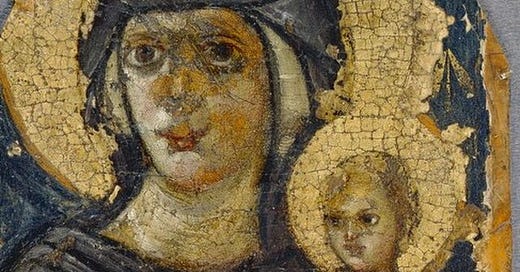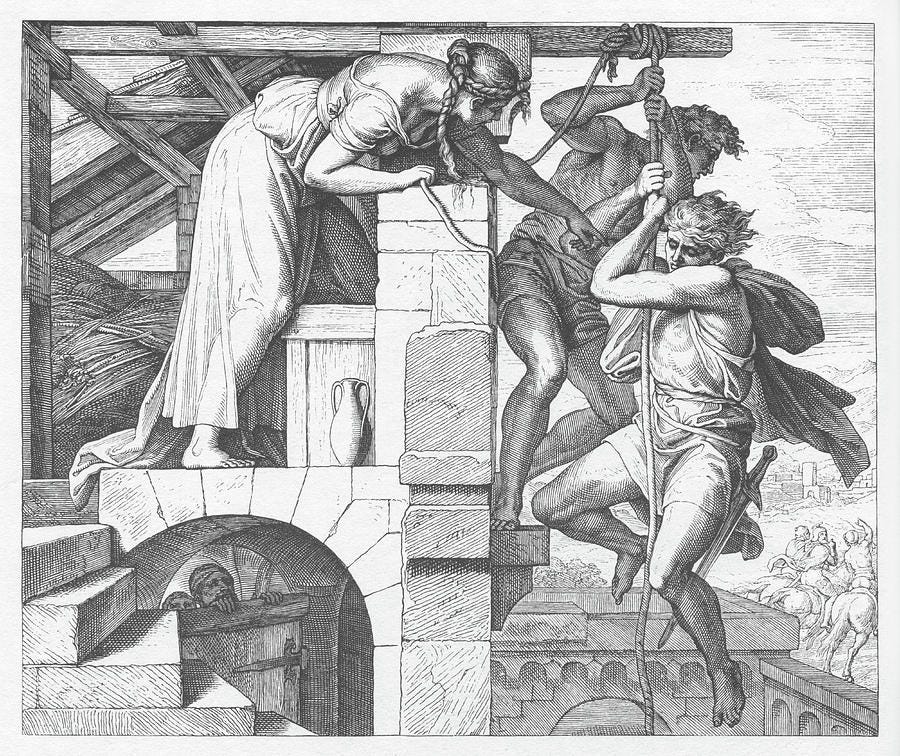I’m kicking off a series for Advent, walking briefly through the Advent and Christmas stories of Matthew and Luke, helping everyday readers “see” in these texts what Bible scholars (like me) notice. The goal is not to upend the precious stories we grew up with, but rather to enhance and nuance them.
Matthew 1:1-17
An account of the genealogy of Jesus the Messiah, the son of David, the son of Abraham.
Matt. 1:2 Abraham was the father of Isaac, and Isaac the father of Jacob, and Jacob the father of Judah and his brothers, 3 and Judah the father of Perez and Zerah by Tamar, and Perez the father of Hezron, and Hezron the father of Aram, 4 and Aram the father of Aminadab, and Aminadab the father of Nahshon, and Nahshon the father of Salmon, 5 and Salmon the father of Boaz by Rahab, and Boaz the father of Obed by Ruth, and Obed the father of Jesse, 6 and Jesse the father of King David.
And David was the father of Solomon by the wife of Uriah, 7 and Solomon the father of Rehoboam, and Rehoboam the father of Abijah, and Abijah the father of Asaph,a 8 and Asaph the father of Jehoshaphat, and Jehoshaphat the father of Joram, and Joram the father of Uzziah, 9 and Uzziah the father of Jotham, and Jotham the father of Ahaz, and Ahaz the father of Hezekiah, 10 and Hezekiah the father of Manasseh, and Manasseh the father of Amos, and Amos the father of Josiah, 11 and Josiah the father of Jechoniah and his brothers, at the time of the deportation to Babylon.
Matt. 1:12 And after the deportation to Babylon: Jechoniah was the father of Salathiel, and Salathiel the father of Zerubbabel, 13 and Zerubbabel the father of Abiud, and Abiud the father of Eliakim, and Eliakim the father of Azor, 14 and Azor the father of Zadok, and Zadok the father of Achim, and Achim the father of Eliud, 15 and Eliud the father of Eleazar, and Eleazar the father of Matthan, and Matthan the father of Jacob, 16 and Jacob the father of Joseph the husband of Mary, of whom Jesus was born, who is called the Messiah.
Matt. 1:17 So all the generations from Abraham to David are fourteen generations; and from David to the deportation to Babylon, fourteen generations; and from the deportation to Babylon to the Messiah,a fourteen generations. (NLT)
Family Matters
The ancient readers of Matthew, most of them I am sure, would have already known some things about Jesus before unrolling the scroll of the gospel. They would have known he was more than human, that he was the Messiah (a royal figure appointed and sent by God), and that he was Jewish. But they would naturally be curious about “where he came from.” I find this kind of thing fascinating, like that Aaron Burr’s maternal grandfather was the famous theologian Jonathan Edwards. (Or, did you know comedian Amy Schumer and politician Chuck Schumer are second cousins? Wild, right?)
Well, Matthew chooses to begin his story of Jesus with a genealogy, a family history. Now, this is not comprehensive, it is selective, and it is not a pure bloodline either per se. The author, Matthew, chooses to tell the “family story” to highlight something. Often, Jewish genealogies are presented to connect the figure to important other people from the past. Matthew does that, but he also throws some curveballs, to make some key points about how God has worked in history, and to set expectations about how and why Jesus is not going to be the exact kind of hero his fellow Jews were imagining, at least in some ways.
Names you expect: If you wanted to connect the Messiah to the great patriarchs and Jewish leaders of the past, you would expect (and find in Matthew) names like Abraham, Isaac, Jacob, Judah, Jesse, David, etc.
Unexpected: But starting with verse (3) you find some curveballs: Tamar? Rahab? These well-known women in Israel’s history would have some scandal attached to their names. Then Ruth the Moabite, reminding us that these women were outsiders. Then “the wife of Uriah,” which hints at the unnamed (but widely known Bathsheeba), with a focus on how David sinned against Bathsheeba and her husband Uriah (which calls into question David’s character). Women of scandal (and faith), men of scandal. What kind of royal genealogy is this?
Exile: A key history marker for Matthew is the “deportation to Babylon.” This was a stark reminder that Israel’s hopes of being a strong, independent nation were dashed with that defeat. And even after they were permitted to return home, things were never the same, and new hopes were placed in the prophesied coming of a great new ruler of Israel, the Messiah.
The Final Twist: The final unexpected twist in the genealogy comes at the very end: “Jacob the father of Joseph the husband of Mary, of whom Jesus was born…” (1:16). Normally Jewish genealogies focused on men, but right there at the end, the story passes from Joseph to Mary, mainly because Joseph had nothing to do (biologically) with Jesus. The spotlight shifts to Mary. The great men of Jewish history are only really connected to the Messiah because Joseph married Mary, the one who miraculously was with child through the Spirit. The Messiah is a gift to Israel and to humanity, he does not “belong” to them in a natural way.
Great Expectations: It turns out, the genealogy tells a story about how Israel came to have a Messiah, but it is far from a simple bloodline report. The genealogy includes outsiders, scandal, women, and exile. It’s a messy family tree. It’s not simply kings making kings. Matthew is signaling that the story of Jesus is going to be full of surprises. So, as you read through the early chapters of Matthew and Luke, take notice that the “action” doesn’t really happen in palaces and large estates of the rich and famous. Jesus comes from a messy and complicated family, his own birth and infant years are messy and complicated. How fitting, then, for Jesus to be the right Messiah to identify with our often messy and complicated lives today.
Take some time right now to thank God for not giving up on us messy people. Advent season is also about hope and looking ahead with great expectation of what God can and will do. Ask God to give you peace and hope as we are reminded of His faithfulness from generation to generation.







Thanks for this illuminating post. I wholeheartedly agree with Janet's comment: Substack has opened up a rich universe of theologians, experts, and faithful Christians. I'm deeply grateful for not being a sole reader in the wilderness. Your book "Strange Religion" (which I discovered through a glowing Plough review, and I discovered this magazine through a card dropped into a used copy of Rilke's poetry) was my gateway into this universe.
Two questions, if I may: Where can we find "typical" or "expected" genealogies to compare with Matthew's account of Jesus?
And being bold after my first comment… I've been seriously considering Northern Seminary. Despite coming from a different professional and academic background, I find myself drawn to several of their programs. If you could sometime write a post that can give us a sense of what makes these programs distinctive and what paths they open up, that would be incredibly helpful. Thank you again!
Nijay. Thank you for this, for us everyday readers. The main reason I came to Substack was to connect and learn from biblical scholars and teachers of scripture. I wanted to learn different perspectives. I so want to dig deeper but at times I feel so inadequate in my simple understanding. I loved this simple teaching. It’s so comforting to know that God uses so many different kinds of “messy” ordinary people.